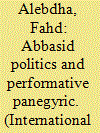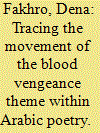| Srl | Item |
| 1 |
ID:
178033


|
|
|
|
|
| Summary/Abstract |
The poet ʿAli ibn Jabala, also called al-ʿAkawwak, was a little known but significant poet who lived during the late 8th and early 9th centuries. This article examines his poetry in its political and cultural context to delineate the literary devices exploited by the poet in his poems of praise. Moreover, this paper interprets existing prose anecdotes claiming that al-ʿAkawwak's panegyric poem to the caliph al-Maʾmun's commander, Abu Dulaf al-ʿIjli, made the caliph so furious that he ordered the poet's execution, despite the poet having never composed any verses overtly criticizing the caliph. The argument is made that, within the tense political atmosphere of the time, the style that the poet embraced in praising the two commanders, Abu Dulaf al-ʿIjli and Humayd al-Tusi, intensified al-Maʾmun's anger toward the poet.
|
|
|
|
|
|
|
|
|
|
|
|
|
|
|
|
| 2 |
ID:
176557


|
|
|
|
|
| Summary/Abstract |
Blood vengeance is a popular literary theme in classical Arabic poetry, particularly in elegies which lament a fallen hero and in the poetic cycles of folkloric epics. The poetic model for blood vengeance was established at least 1500 years ago, and persists to the present day. In this article, I focus upon the role that language plays in such rituals and, specifically, how the poetic speech act shapes memory and conditions behaviour. More recently, modern jihadist movements provide a political backdrop for newer poems, from across the Arab world, which contain the old blood vengeance message. My research traces the migration of this code through examination of a cross-section of Arabic poetry. Poetry belongs to a ritual complex, whereby a hymn of incitement provides an imperative for a bloody act. Moreover, rituals are legitimized by ancient myth, which not only ennobles blood lust, but is perpetuated by their repetition or reinterpreted over time.
|
|
|
|
|
|
|
|
|
|
|
|
|
|
|
|